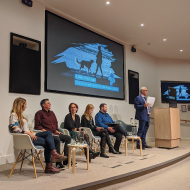Conference highlights how society can benefit from pet ownership

The conference concluded with a panel discussion exploring what benefits animals can bring to individuals and the wider community.
Experts on mental health, pet welfare, loneliness and poverty met in London on Thursday (28 November) to discuss how more people can benefit from pets and contact with animals.
The conference coincided with the launch of a Blue Cross report examining the devastating impact these problems have on society, and how pet ownership is the beneficial ‘link in the chain’ for so many people. Blue Cross would like to see further scientific research carried out in this area to enable the development of more evidence-based policies.
During the event, attendees heard from a host of inspiring speakers, including Professor the Lord Trees and Dr Mel Moss, consultant psychiatrist at Sussex Partnership NHS Foundation Trust. Dr Moss talked about her Pets as Therapy (PAT) dog Mutley, and how together they have had a major influence in shaping the culture and practices on their ward.
There were also talks from representatives of a number of charities, including Dogs Trust, Mayhew and the PDSA.
Zoe Edwards, head of animal welfare at Mayhew, spoke about how demand for the charity’s services has increased concurrently with the rise in poverty across the UK. Indeed, figures from the independent Social Metrics Commission show that approximately 14.2 million adults are living below the poverty line.
Delegates heard emotional and heartwarming stories from people whose lives have been changed by their pets. In one poignant video, Amanda Graughran explained how her Blue Cross horse, Jasmin, gave her a sense of purpose following the death of her daughter, Genna.
Amanda said: “When we first brought Jasmine home, she was very unsure of people around her and where she was. It was within 18 months of losing Genna and it gave us something, me particularly, to focus on. Especially when I had to finish work of the job I was doing at the time.
“Jasmine seemed to feel what you were feeling and understand what you were going through. Maybe because she’d been through something similar herself. The way I would describe her when she came, is that she was depressed. That’s how I got, and the anxiety that went with it. And it just felt as though she understood, and that was a comfort.”
The conference concluded with a panel discussion exploring what benefits animals can bring to individuals and the wider community. The panel included Mandy Bentley and Amy Rosa, representing St Mungo's homeless charity, Andrew James from Hearing Dogs for Deaf People, Nottingham researcher Jenny Stavisky, and Karen James, head of volunteering at Blue Cross.
Steve Goody, COO and deputy chief executive at Blue Cross, said: “It is our charity’s aim to demonstrate how important and life-enhancing pets are to people, especially those living in vulnerable and challenging situations. With these benefits quite literally saving lives, we are committed to breaking down the barriers that are preventing those in need enjoying the rewards pet ownership can bring.
“Every day we see people using our services that would be bereft and alone without their animal companion. That is why Blue Cross are dedicated to being a voice for both pets and people and working to ensure the benefits of pet ownership are embedded across all areas of society.”



 The latest
The latest